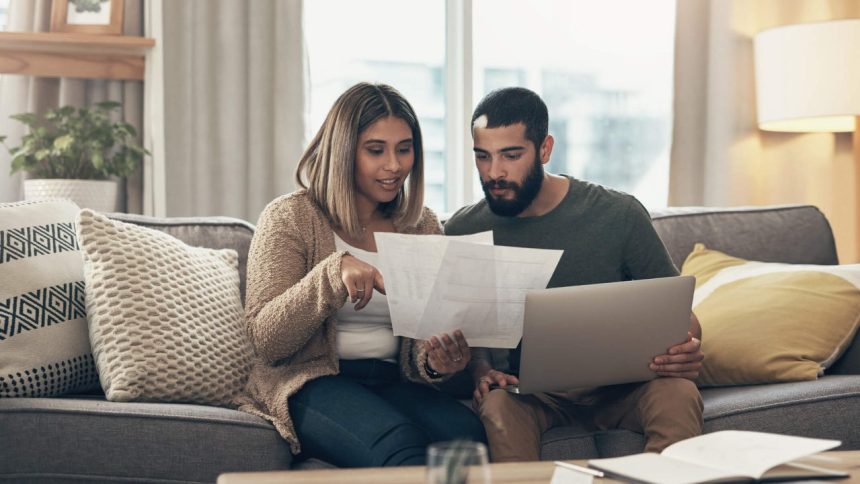Our writers and editors used an in-house natural language generation platform to assist with portions of this article, allowing them to focus on adding information that is uniquely helpful. The article was reviewed, fact-checked and edited by our editorial staff prior to publication.
Key takeaways
- Paying credit card bills on time or early is crucial for building good credit and avoiding fees.
- There are various ways to pay credit card bills, including online, by phone, or with cash.
- It’s important to keep track of when credit card bills are due to avoid late payments and potential penalties.
If you use a credit card, you will receive credit card bills and will need to know how to pay them off.
If you’re unfamiliar with the process, you may be wondering things like, should I make online credit card payments or pay by phone? Is it possible to visit an ATM and pay a credit card bill with cash? Can I pay a credit card bill with another credit card?
Most people make credit card payments online, and many set up auto-pay to make the process even easier. But not everyone knows that there are strategies you can use to pay off your balances more quickly, save on interest and improve your credit score.
Let’s look at how to pay your credit card, when you should pay your credit card bill and how you can choose the best credit card payment options for your long-term financial goals.
When should I pay my credit card bill?
When is the best time to pay your credit card? You have two good options: on-time or early.
Your credit card payment history makes up 35 percent of your FICO credit score, which means that regular, on-time payments are an essential part of building good credit. You won’t have to pay any interest on your purchases if you pay off your credit card statement balance every month; however, experts recommend paying off your balance every two weeks.
On the other hand, missing a payment or making a late payment is not only bad for your credit score but can also cost you. If you don’t make your payments on time, your credit card issuer might charge late payment fees or raise your interest rates to the penalty APR level.
When do I receive my credit card bill?
Billing cycles generally last between 28 and 31 days. You’ll receive your credit card statement at the end of your billing cycle, either by mail or electronically, depending on your preferences.
Your credit card bill due date should be the same date every month, and you should also expect to receive your credit card bill on or around the same date each month. The Credit CARD Act of 2009 requires credit card issuers to give consumers at least 21 days between the date the statement is mailed or delivered and the date the payment is due. This should give you enough time to review your statement, dispute any unfamiliar charges and make your payment on time.
How can I pay my credit card bill?
The easiest way to make a credit card payment (and never miss one) is to set up automatic payments online. However, there are more manual options as well.
Online payments
Many people make online payments on their credit cards, during which money is transferred from a bank account to a credit card account. If your credit card issuer offers mobile banking, you can also make payments through your credit card app. Online payments are easy to make and even easier if you sign up for autopay, which is why it’s become so popular.
Over the phone
If you want to make a credit card payment over the phone, call the number on the back of your credit card. Before you make the call, make sure you have the bank account number of the checking or savings account from which you’d like to have the payment deducted.
With cash
Although some credit card issuers still accept cash payments deposited in a bank branch or at an ATM, other issuers have started restricting or eliminating the cash payment option. Check your credit card issuer’s guidelines before attempting to pay your bill with cash.
However, you can mail your credit card issuer a paper check. The instructions for doing so will be on your credit card statement.
Can you pay a credit card with another credit card?
While it is technically possible to pay one credit card with another by taking out a cash advance on one credit card and using that cash to pay another credit card, this is rarely a good idea. Cash advances can be extremely expensive since they come with both cash advance fees and high interest rates.
Plus, any cash you take from a credit card becomes new debt. If you’re struggling to pay off your credit card without borrowing from another credit card or opening a balance transfer credit card, it’s time to take a serious look into debt relief options.
Should you carry a balance on your credit card?
Whenever possible, try to avoid carrying a balance on your credit card. Carrying a balance can cost you a lot of money. Not only will you be charged interest on your outstanding balance, but that interest can also compound over time.
Plus, carrying a balance means losing access to your credit card’s grace period, if applicable. Most credit cards offer a 21-day interest-free grace period on purchases — but that grace period only applies if you pay your statement balance in full each month. If you can’t pay off your statement balance in full, you’ll be charged interest not only on your outstanding balance but also on all new purchases made with the card.
If that is the case, try to pay off as much of your credit card balance as possible. If you only make the minimum payment on your credit card, it could take you a very long time to pay off your debts — especially if you’re stuck with high interest rates.
Bankrate’s minimum payment calculator can show you just how much money that minimum payment will cost you, as well as how much you could save if you made a larger payment every month.
Tips for paying credit card bills
If you want to get even better at paying your credit card bill, here are some expert-level tips:
-
Many credit card issuers make it very easy to change your credit card bill due date. You can move your due date so it coincides with your payday, for example, or you can stagger your credit card due dates throughout the month so you don’t have to pay multiple credit card bills on the same day. Figure out a due date that works for you and your finances and request it. Keep in mind that it may take one to two billing cycles for this date change to be reflected.
-
If you want to make sure you pay your credit card bill on time every month, automatic payments are one of the best ways to get the job done. When you set up autopay online, money is automatically withdrawn from your bank account to make your credit card payment. You can decide whether to make the minimum payment, pay off your statement balance in full or pay a fixed amount every time.
-
If you’re trying to pay down credit card debt, making extra credit card payments can help you whittle down your balances and lower your monthly interest charges. Since credit card interest compounds, each additional payment you make now could save you a lot of money later.
-
The most important thing you can do to pay off your credit cards is to have a plan. How much money are you going to put toward your credit card bills each month? How often are you going to make credit card payments? Should you use the snowball method or the avalanche method to help you pay down your debt?The more you plan, the more likely you’ll be able to develop a strategy that will help you pay your bills on time — and, over time, pay off your credit card debt in full.
The bottom line
Paying your credit card bill on time or early is crucial for building good credit and avoiding fees. This can be done easily through online or phone payments, but using another credit card to pay off a balance is not recommended.
Remember to keep track of your billing cycle and due date to avoid late payments and potential penalties. By taking control of your credit card payments, you can improve your credit score and work toward applying for one of the best credit cards on the market.
Read the full article here














